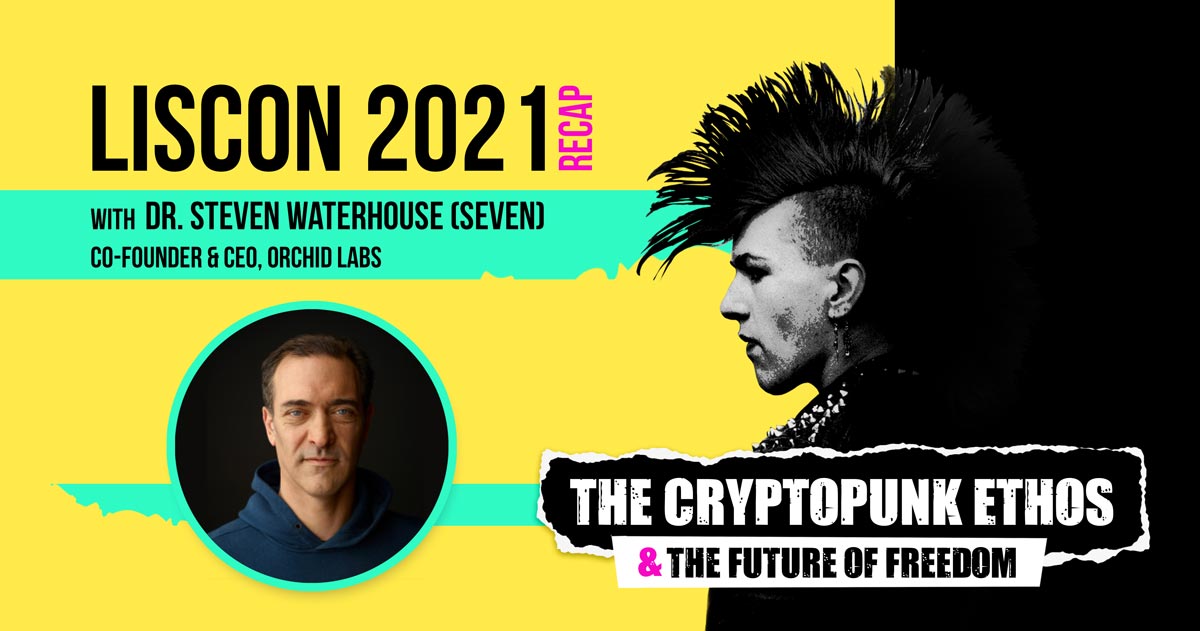
Orchid CEO Dr. Steven Waterhouse Speaks at LisCon 2021
Oct 28, 2021On Wednesday, October 20th, Orchid CEO Dr. Steven Waterhouse (Seven) spoke at LisCon, an Ethereum community event that gathered Web3 thought leaders from around the globe. Seven's talk focused on the evolution of the Internet from the decentralized, anti-establishment culture of its early years to today's centralized, "walled garden" online landscape. Seven spoke on the importance of bringing decentralization back to the web—and to the world.
Freedom of expression was at the heart of the early Internet
In his opening remarks, Seven reflected on the earliest days of the web. "The original Internet was a ground-up, rather 'punk' phenomenon, where individuality, exploration, and freedom were bedrock principles," he said. "It was a revolution—not just of technology, but of philosophy.
"The idea that anyone, anywhere, could communicate with anyone else with no intermediary gatekeeper was completely unprecedented. Anyone with access to an Internet connection could share their thoughts, and everyone else in the world could see what they had to say."
By empowering people worldwide with freedom of expression, the Internet was one of the earliest and most potent examples of decentralization in action. Not only did this change the ways that people communicate—it also disrupted several industries.
"This first wave of decentralization was the death knell for a lot of centralized legacy systems and business models, from travel agents to bookstores. It has mostly killed local journalism. At the same time, ordinary people suddenly were able to gain a global platform, and many did—first in the form of blogs and web pages, and now through the powerful engine of social media."
Today's Internet culture has given way to surveillance and control
"Right through the early 2000s, the Internet seemed poised to shape an ever more open, free, people-centered world." But that's not what happened: "The Internet we have today has lost this sense of individuality. It has come to threaten the very ethos of freedom that gave rise to it," Seven said.
"Somewhere along the line, radical openness, borderless connection, and limitless exploration gave way to mass surveillance, unprecedented government and corporate control, and increasing misery among the population. Social media is compared to big tobacco in terms of its negative effects on people's health; governments and other third parties spying on people is so commonplace that laws are being passed urgently to address it."
Despite the Internet's progression toward surveillance and control, Seven believes that there's hope for the future. From where does this hope stem? Blockchain technology.
"Luckily, we've got another chance. Crypto is driven by the same anti-establishment, punk sentiments that drove the rise of the Internet. The fact that it draws such heated ire from so many vested interests—governments, regulators, corporations, banks—is proof of its power. People don't try to kill things they don't fear."
The Orchid team believes in the potential of a decentralized Internet to effect positive change around the world. That's why Orchid exists: to restore the Internet as a place of self-expression and freedom. Orchid's VPN marketplace is open-source and decentralized, and uses an innovative system of probabilistic nanopayments to ensure users always have access to ample bandwidth. And anyone can start using Orchid with an ordinary credit card and just $1.
Download the Orchid app to start exploring the Internet freely.
If you enjoyed this blog, subscribe here for privacy news, commentary, and product updates from Orchid.



